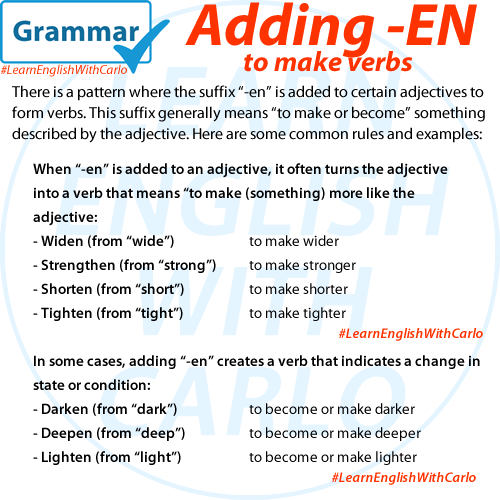In English, some adjectives can be turned into verbs by adding the suffix -en. These verbs usually indicate the process of becoming or making something have the quality described by the adjective. Understanding how and when to use -en to form verbs can greatly expand your vocabulary and improve your communication skills.

How Does It Work?
When you add -en to certain adjectives, the word becomes a verb that either:
- Describes a change in state (for example, becoming something).
- Describes an action where you cause something to change (for example, making something become a certain way).
Common Examples:
- Adjective: Wide → Verb: Widen
- Meaning: To make something wider or become wider.
- Example: “The city plans to widen the streets to reduce traffic.”
- Adjective: Deep → Verb: Deepen
- Meaning: To make something deeper or become deeper.
- Example: “They need to deepen the river to prevent flooding.”
- Adjective: Weak → Verb: Weaken
- Meaning: To reduce strength or become less strong.
- Example: “His illness weakened him considerably.”
- Adjective: Soft → Verb: Soften
- Meaning: To make something softer or become softer.
- Example: “She used conditioner to soften her hair.”
- Adjective: Short → Verb: Shorten
- Meaning: To make something shorter or become shorter.
- Example: “The tailor will shorten the pants to fit you.”
Patterns and Exceptions:
- Not all adjectives can be turned into verbs using -en. For example, adjectives like beautiful or happy do not have -en verb forms. There is no verb form like beautifen or happien.
- Some adjectives already have their own verb forms without needing -en, such as strong → strengthen or long → lengthen. In these cases, we use a slightly modified form, but the concept is similar.
Special Cases:
- Some verbs in English have an -en ending but are irregular or don’t follow the typical pattern. For example:
- Adjective: Red → Verb: Redden
- Example: “His face reddened in embarrassment.”
- Adjective: Black → Verb: Blacken
- Example: “The smoke blackened the walls.”
- Adjective: Red → Verb: Redden
- In some cases, the opposite process happens. For example, instead of adding -en to make a verb, English often uses other forms or entirely different verbs to describe the process:
- Adjective: Hard → Verb: Harden
- Example: “The concrete needs time to harden.”
- Adjective: Hard → Verb: Harden
Tips for ESL Students:
- Practice with common adjectives: Start by learning the most frequently used adjectives that can become verbs with -en, such as widen, soften, shorten, and deepen.
- Be aware of exceptions: Remember that not all adjectives will work with this pattern, so it’s important to check and practice regularly.
- Listen for these verbs: Native speakers use these verbs frequently in daily conversations, so try to notice how they are used when listening to English.
By learning how to turn adjectives into verbs with -en, you’ll increase your flexibility and range in English. The more you practice, the easier it will be to recognize and use these forms.
